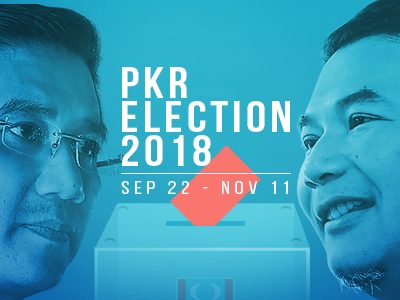

PKR has the longest electoral process in the country.
It releases weekly results by divisions, which
Malaysiakini compiles and distills here for our readers to easily keep track.
| Penang | 7% | Sep 22 |
| Johor | 4% | Sep 30 |
| Kelantan | 5% | Oct 5 |
| Terengganu | 1% | Oct 5 |
| Pahang | 3% | Oct 6 |
| Wilayah | 4% | Oct 7 |
| Selangor I | 14% | Oct 14 |
| N Sembilan | 4% | Oct 20 |
| Perlis | 1% | Oct 21 |
| Selangor II | 9% | Oct 21 |
| Kedah | 6% | Oct 26,27 |
| Perak | 7% | Oct 27 |
| Selangor III | 8% | Oct 28 |
| Sabah | 18% | Nov 3,4 |
| Sarawak I | 6% | Nov 10 |
| Sarawak II Malacca |
3% | Nov 11 |
All tallies are final. However, breakdown is incomplete as PKR did not make public the final results for certain states and divisions.
**Does not include Labuan and Julau.
The 4 candidates with the most votes at the end of the election will become the new PKR vice presidents.
The 20 candidates with the most votes are the new PKR central committee members.
PKR is the only party in the country where its national leadership elections take place over several weeks. All other parties in Malaysia can complete the process in a day because of their smaller voter bases.
For example, only 1,209 PAS delegates could vote in the 2017 party election. Umno, which practices an expanded delegates system, had about 146,500 eligible voters in its recently concluded party election.
As for PKR, the party had around 760,000 members in June 25 alone and most of them are eligible to vote.
This site, developed by Malaysiakini and updated weekly, helps readers to keep track of the trends and swings as the election develops.
Anwar Ibrahim won the position of PKR president uncontested.
Malaysiakini obtained the lists of names containing candidates endorsed by each team and colour coded them accordingly.
Interim results are votes cast by eligible PKR members who are listed on the party's electoral roll. These results are normally made available within 24 hours after voting.
However, members whose names do not appear on PKR’s electoral roll can also vote, but they must fill in a form and their votes will be counted separately.
These will be categorised as "doubtful votes" (undi ragu) and must go through a verification process to determine if the voter is a genuinely eligible PKR member.
Once the members have been verified, these votes will be added to the interim results, thus producing the final results. This process can take up to two weeks.
All states will conduct their elections over one weekend except for Selangor, which will vote over three weekends.
This is because Selangor PKR has the largest membership of all states, comprising about a third of total members.
On Oct 14, the divisions of Sabak Bernam, Sungai Besar, Hulu Selangor, Serdang, Kelana Jaya, Subang, Kapar, Kota Raja and Sepang will vote.
This is followed by Puchong, Gombak, Petaling Jaya Utara, Petaling Jaya Selatan, Kuala Langat and Selayang on Oct 21.
Finally, the divisions of Tanjong Karang, Kuala Selangor, Ampang, Pandan, Shah Alam and Hulu Langat will go to the polls on Oct 28.
We've detailed how the system works in our KiniGuide.